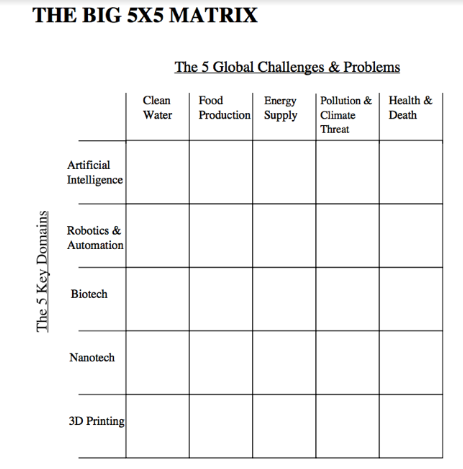This article is an edited version of a response to an email I received from a listener (and current student of the Future Skills Program), who asked me the tough question “Which areas should I go into if I want to be successful, and what should my approach be?”
//Mike
My answer:
Rather than jumping on the bandwagon, and going with what’s currently trendy, consider what big problems exist for large groups of consumers (that have purchasing power and a demand to fix their painful problems).
My answer is grounded in the framework I developed and call “the Big 5×5 Matrix”, consisting of mankind’s five biggest problems and the five technologies most viable to solve these problems. (We discussed this on the podcast in episode 44.)

-
Global warming
-
Water
-
Food
-
Pollution
-
Longevity/death
These are the top 5 technologies that can be used to solve the problems. Hence, supply.
Any kind of specialized expertise related to these technologies is likely to become a valuable future skill:
-
Artificial Intelligence
-
Robotics, automation
-
Nanotechnology (active and passive: materials and nanomachines/computers)
-
Biotechnology (pharma, gene therapy, food, fuel/energy, carbon capture, pollution clean-up)
-
Additive manufacturing, dead and alive (living cells to organs)
-
Skill set, ability or interest required?
-
Likelihood of success, growth, profitability for the category?
-
Inherent demand, sustainability for area: Maslow level?
-
Valuation, investment availability, start-up potential?
-
Physical capital requirements (machines? expenses?)
-
Programming
-
Virtual and Augmented Reality, vision, telesurgery
-
Bionics (sense restoration and augmentation, X-ray vision, e.g.)
-
Artificial agents
-
Space exploration and mining
-
Artificial biology
-
Genetics
-
Stem cell research
-
Organ printing
-
Driverless vehicles
-
Neurology/brain interfaces
-
Multi-resistant bacteria/bacteriophages
-
Mechanics
-
Motors/actuators
-
Psychology/emotion sensing and manipulation
-
Surgery
-
Health care
-
Pandemics
-
Carbon capture
-
Desalination of sea water (source, clean, transport, finance…)
-
Fusion (chamber, materials, fuel, storage…)
-
Solar cells
-
Housing (prospect, plan, materials, energy, agri)
-
Migration (where to live, how to be integrated, educated)
-
Debt clean-up
-
Entertainment (incl. porn)
-
Psychology (dealing with migration or not fitting in the automated world of the future)
-
Energy storage (batteries)
-
Vertical farming
-
Insect farming
-
Algae farming
-
Ecological (insect fed) fish farming
Some more thoughts on the above:
No one wants to die (or look old and ugly) and rich people are willing to pay lots of money for cutting edge solutions. People need to eat, and if the global population increases while income distribution becomes more skewed, it puts a pressure on production of cheaper food, vitamins and supplements. Many of the big cities are already crowded (Tokyo, Singapore, and New York) but new people will still want to live there. This inevitably drives demand for real-estate development, skyscrapers, and more effective solutions for living.
I will continue my train of thoughts in an upcoming article coming soon, over the next few days.
[Finished: Read part 2 here]


As you might imagine, I take exception to much of your listing of growth technologies, and also to the underlying premise.
First - energy /per se/ is not a problem: the problems are political resistance to nuclear fission, and the transduction of energy for uses (primarily transportation) to which electricity does not lend itself.
Second - some items like space mining, vertical farming, fusion energy, or battery energy storage, are very far-fetched and highly unlikely to lead anywhere.
Third - a lot of these items may turn out to be false leads, or take too long to materialize. Carbon capture? Probably not happening this century. Pandemics? Might or might not, and we might or might not do anything about it. Self-driving cars? Maybe in twenty years, if the unregulated prototypes don’t kill too many people.
Finally: if you want to be successful, the real question is not what trendy new technologies /might/ turn out to be important. The question is which fields will reliably provide immediate opportunities and, if they change, at least involve skills and experience that will remain valuable.
Some of the items on the list meet this definition, some don’t. If jobs for solar cell researchers decline, those experts may be out in the cold. Bionics is promising, but it was promising sixty years ago; maybe there will be breakthroughs and explosive growth soon, maybe not.
Other things on the list are pretty vague. I can’t see health care doing anything but grow, but any of the thousands of fields within it might be obsolete in ten or twenty years. Others aren’t very approachable - how would one prepare for a career in space mining?
My advice would be to look for /skills/ that are transferable between fields and hard to replace. E.G: It takes a lot of work to become a surgeon - could surgery be done by robots? Fully driverless cars are 20-30 years away, and the field might slow down a lot in the meantime. But programming for visual recognition is essential in either case. I haven’t heard much talk lately about automated surgery, but it would be easier for a robot to replace a surgeon than a driver. Anyone capable of programming for visual recognition is going to be in demand, somewhere, for a long long time.